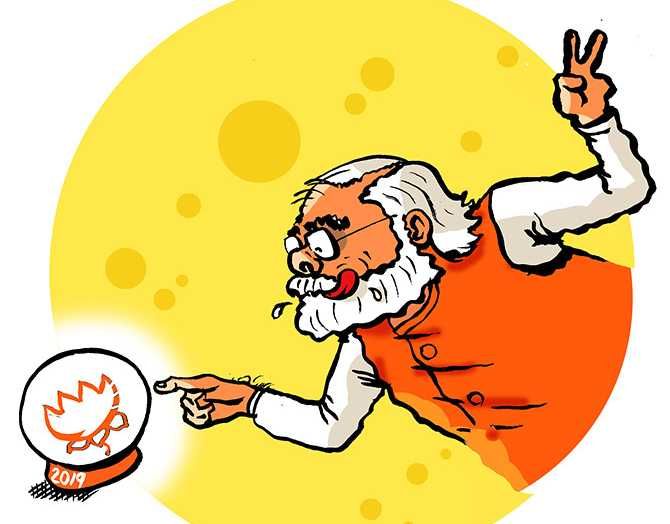As the 2019 election draws near, investors focus on long-dated options.
While call options benefit buyers if the market rises, buying put options acts like insurance for their portfolio.
Sachin P Mampatta and Sameer Mulgaonkar report on how investors are playing out their bets in the run-up to 2019.

Illustration: Dominic Xavier/Rediff.com
A mixture of uncertainty ahead of next year's general elections, multiple state elections during the year, and global events may nudge investors towards buying protection for their portfolios following a year in which markets touched all-time highs.
Some of this is already happening through activity in long-dated options, which provide protection against downside risk.
The IIFL Capital Enhancer Fund will invest 4 to 5 per cent of its assets in put options, with an option of increasing this to 6 per cent.
"We will be investing in put options with an expiry of June 2019. There are many investors who would like to take exposure to equity. They are afraid of uncertainty over the next year. This will allow them to do so while limiting their risk," says Prashasta Seth, CEO, IIFL Asset Management, which is hoping to raise around Rs 20 billion to Rs 30 billion in his new fund offer, NFO.
Activity is measured in terms of the number of active contracts (open interest) in derivatives.
The current open interest is 27.53 million for long-dated options on the benchmark Nifty index.
"Activity has not yet picked up in June 2019 expiry compared to the buildup in contracts which will expire in December 2018," says Vikas Jain, senior analyst, Reliance Securities.
"The positions built up in June 2019 could be because some investors are trying to hedge their overall exposure to the equity market and protecting themselves from a downside risk," explains Jain.
While call options benefit buyers if the market rises, buying put options acts like insurance for their portfolio.
Such protection from falling markets is more easily available for the short-term, say, two or three months.
Those who want to protect themselves from what might happen over the next year do so by investing in long-dated options.
This is more difficult to invest in since they are typically illiquid.
However, fund houses and other large entities can tie up with institutions which, for a fee, will act as a counterparty to put or call options that expire far in the future.
They don't offer the service to small, retail investors. But it is open to larger players that bring enough business to the table for it to be a profitable trade.
There has been similar build-up in options before, but the space is interesting to watch now because of the multiple events lined up over the next year.
'The world's biggest democratic elections are twelve months away and the market is likely to start pricing in an election outcome in the coming months,' noted foreign brokerage Morgan Stanley India in its April 16 India Strategy report.
<p">The next 12 months are also marked by multiple state elections, including those in Karnataka, Mizoram, Chhattisgarh, Madhya Pradesh and Rajasthan.
Besides, the US Federal Reserve is also expected to tighten liquidity conditions. This can have a negative impact on the stock markets, which recently reached new highs.
The S&P BSE Sensex touched an all-time high of 36443.98 in January.
The general election's outcome is still up for grabs despite recent improvements in the economy, according to the Morgan Stanley report.
'Growth has accelerated over the last few months, which puts the incumbent BJP-led NDA government in a good position for the 2019 elections. However, growth is not strong enough for this position to be totally secure,' the Morgan Stanley report said.
Experts suggest there are other methods to curb risk. Retail investors could put money in dynamic equity funds.
Richer investors could allocate capital to alternative investment funds to help limit their downside.
Cost and liquidity concerns, they said, associated with long-dated options can also be addressed through these alternatives.












 © 2025
© 2025